- Home
- Robert Rankin
The Mechanical Messiah and Other Marvels of the Modern Age Page 11
The Mechanical Messiah and Other Marvels of the Modern Age Read online
Page 11
‘You are making a terrible mistake.’
‘Then this conversation is at an end. Kindly leave the premises.’
‘But I have—’ Cameron Bell almost said, Things that need doing here. A crime scene to investigate. But he did not. Instead he said, ‘I must then fetch my hat and umbrella. I left them in the apartment of Lord Andrew Ditchfield.’
‘I will have one of my chaps accompany you,’ said Commander Case.
Cameron Bell did not retrieve his hat and his umbrella. After all, he was wearing a hat and he was carrying an umbrella. He did, however, speak with Lord Andrew Ditchfield, sharing with him the appalling news that the Electric Alhambra was to be closed whilst police investigated the two murders. Then making the suggestion that should Lord Andrew continue to employ him in the capacity of personal private investigator, he felt confident that he could solve the cases and have the theatre opened in a very short time.
Lord Andrew Ditchfield had engaged in considerable flustering and flapping around. But he had at least agreed to retain the services of Cameron Bell. Including the ‘incentive bonus’ the private detective suggested might help to grease the cogs of cogitation and ensure an early and satisfying outcome.
Cameron Bell now left the Electric Alhambra.
As he stood before the Music Hall awaiting a hansom cab, he mused upon the doings of the day. It had certainly been a full day and he felt he was making some progress. Although he had not been expecting Smelly Charlie Belly to go up in a cloud of smoke.
‘Do you think you might assist me, sir?’
Cameron Bell turned at this voice. It was one that he recognised.
‘Oh,’ said Alice Lovell. ‘It is you, Mr Bell. I am thankful for a kindly face in my moment of need.’
‘Moment of need, dear lady?’ asked Cameron Bell.
‘I am moving to new lodgings. I can manage most of my bags, but the kiwi birds as well … It’s rather difficult.’
‘It will be my pleasure to assist you, Miss Lovell.’
The kiwi birds were quiet in their carrying cage.
‘Sleeping?’ asked Cameron Bell as he lugged the weighty cargo through the stage door and out into the gaslit alleyway.
‘Chloroform,’ said Alice Lovell. ‘They make such a fuss otherwise.’
Cameron Bell was now burdened down not only by kiwis, but by hatboxes, carpet bags and Heaven knew what else.
Alice Lovell carried nothing but her handbag and her parasol.
‘Perhaps we might share a hansom,’ she suggested. ‘Oh indeed, fair lady. Oh yes indeed.’
It was all too much for a hansom and so they had to wait for a four-wheeled ‘growler’ to come rolling by. This was one of the new electrically driven horseless carriages, low-slung, high-wheeled and comfortable within. The driver sat before them, working controls and humming a Music Hall tune.
‘We will drop you off first,’ said Cameron Bell. ‘What is the address of your new lodging house?’
‘Ninety-five Carlton Road,’ said Alice Lovell.
‘Oh my dear dead mother,’ said Cameron Bell.
A full moon hung in the sky above and London dreamed in its glow. All seemed to be at peace in the great metropolis. Cameron Bell looked up at the sky, then stole a glance at his travelling companion. She was so beautiful. And so near. He could smell her perfume. Her elbow was nearly touching his knee. If only it could be, dreamed Cameron Bell.
‘Wasn’t it terrible about Mr Belly?’ Alice’s words broke the spell.
‘Terrible,’ said Cameron Bell.
‘I thought you were supposed to be solving the case.’
‘I was,’ said Cameron Bell. ‘I am.’
‘I bet no one will want to top the bill tomorrow night.’
‘Oh dear,’ said Cameron Bell. ‘Were you not informed? The theatre is to remain closed whilst the police go about their investigations.’
‘Oh no!’ cried Alice Lovell. ‘Then we shall not be paid.’
‘You will be paid,’ said Cameron Bell.
‘Not if we do not perform.’
‘I spoke earlier with Lord Andrew Ditchfield,’ said the private detective. ‘I insisted that the performers must be paid during the time the theatre is closed.’
‘You did?’ asked Alice Lovell. And leaning over she kissed Mr Bell, right on the side of his cheek.
‘I did,’ said Mr Cameron Bell. Who knew full well that he had done nothing of the kind. But concluded that he really must tomorrow.
‘You are a wonderful man,’ said Alice Lovell. And she kissed him again.
Cameron Bell blushed rosy pink. And then he said, ‘Dear me.
‘Is something wrong?’ asked Alice Lovell, giving his arm a squeeze.
‘I have just remembered,’ said Cameron Bell. ‘I was supposed to be escorting Mr Merrick back to the London Hospital. But with all the excitement, I left him sitting in the expensive box we occupied together.’
‘Serves him right,’ said Alice Lovell. ‘He is a dreadful man. I went to visit him once in his rooms. It used to be a very fashionable thing to do. He dropped his handkerchief and when I bent down to pick it up, he pinched my bum.’
Cameron Bell fought with hilarity and chewed upon his bottom lip. Perhaps there had been some justice after all this evening.
‘Carlton Road,’ called the driver of the growler.
And Carlton Road it was.
Cameron Bell unloaded the worldly goods of Alice Lovell and paid off the cabbie. ‘I will help you to your lodgings,’ he said. ‘Then I will engage another cab.’
‘You are most kind, Mr Bell.’
‘Oh, do please call me Cameron.’
As Cameron struggled and Alice Lovell tottered lightly in her heels, they approached the theatrical diggings of number ninety-five.
‘You took the room so recently occupied by the now late Harry Hamilton,’ said Cameron Bell as he staggered beneath his load.
‘You really are a detective,’ said Alice Lovell. ‘Now we must be very very quiet when we enter the house. We would not want to wake anybody, would we now?’
Nor, suspected Cameron Bell, announce the arrival of a flock of kiwi birds that no landlady in her right mind would ever agree to have upon her premises.
‘I will be mouse-like,’ said the private detective. ‘Which floor is your room upon?’
‘The very top. You can see the two windows up there.’
Cameron Bell peered upwards. ‘So is the room presently unoccupied?’ he asked.
‘There was a portmanteau that a gentleman was to collect. ‘Cameron Bell made a bitter face. He well remembered that portmanteau. ‘But no one should be in the room now?’ he whispered.
‘Not at this time, no.’
‘I saw a flash of light at a window, as of a bullseye lantern. There.’ Cameron Bell, having nothing other to gesture with, gestured with his chin. ‘See it again. Someone is moving about in the room.’
‘Most curious,’ said Alice Lovell.
‘Someone who should not be there,’ whispered Cameron Bell, ‘for otherwise they would have lit the gas mantle.’
‘Curiouser and curiouser,’ said Alice.
Cameron Bell relieved himself of his burdens. ‘Give me the front-door key,’ he said, softly. ‘And please wait here until I return.’
For a heavyset fellow, Mr Cameron Bell could move at times with the delicacy of a Siamese cat. His footfalls on the stairs hardly registered in the silent house. And though he was caused to halt upon the second landing and draw his breath, the journey up was achieved with admirable furtive speed.
He paused before the door he sought, noted a brief flash of light flicker beneath it and engaged upon an inner dialogue.
Beyond this door, said Cameron Bell, to no one but himself, someone moves about. Doing what? Searching for something, would be my considered opinion. Searching for what? Something that the searcher did not find in the portmanteau he stole? Perhaps. Something that has been represented as being the lost Ring of Moses, perha
ps?
Satisfied with the logic of these propositions, Cameron Bell drew out his pistol, checked it, cocked it, put his free hand to the handle of the door. Turned it gently.
Then flung open the door.
‘Officer of the law,’ cried Cameron Bell. ‘Drop any weapons and raise your hands, if you will.’
The beam of a bullseye lantern caught him full in the face. The roar, as of some savage beast, brought fear to Cameron Bell. Something leapt towards him from the darkness.
The private detective shielded his face and fired his pistol blindly into the room. Again and again and again and again until he ran out of bullets.
17
here was chaos in the theatrical dig-gings.
Artistes in various states of undress filled the halls and crowded the stairs. Lucy Gladfield pushed her way amongst them.
There was much light now, for all mantles were lit.
Cameron Bell called down from the topmost landing. ‘There is no cause for alarm,’ he called. ‘Everything is under control.’
‘Everything is far from that,’ cried Lucy Gladfield. ‘And what are you doing in my house?’ And spying the pistol added, ‘And who have you shot?’
‘A burglar and I suspect a murderer, too,’ the private detective called down. ‘But everything is now under control.’
‘Let me get up there.’ Lucy Gladfield, proprietress of the establishment, forced her way to the top of the stairs.
Cameron Bell said, ‘Madam, if you please—’
‘Let me pass,’ demanded Lucy Gladfield. ‘I want to see just what went on in one of my finest rooms.
‘I really do feel it best that you do not.’
Lucy Gladfield glared at Cameron Bell. ‘How did you get in here?’ she wanted to be told.
‘The front door was unlocked.’ Cameron Bell was never too far from a necessary untruth. ‘I suspect the burglar picked the lock. After we both observed Harry Hamilton’s luggage being stolen this morning, I felt it prudent to keep a watch on the house this evening, in case the villain returned, seeking even more.’ He paused here to gauge the reaction of the landlady.
Lucy Gladfield bobbed her head. It was enclosed by a tight and laced night bonnet. Clearly the helter-skelter hairdo was a wig.
‘Is he dead, this burglar?’ Lucy Gladfield squinted into the darkness.
‘It would probably be for the best if I went in alone to find out.’
‘Yes, probably.’ The wigless woman offered her box of lucifers to the private detective. ‘There is a mantle to the left of the door,’ she said.
‘My thanks.’ Cameron Bell struck a lucifer, held it before him. Entered the room.
He turned up the mantle and lit it.
The room welled into light. It had been thoroughly ransacked. Bed linen cast to the floor. Pillow torn open. Wardrobe overturned. But all done evidently in silence so as not to awaken the household.
Lucy Gladfield fell back in alarm. ‘You have shot a child, ‘she cried and fainted dead away.
In the middle of the untidy room, the toppled and extinguished bullseye lantern by his side, lay a small, slight figure. Face down in a spreading pool of blood.
Moving on the lightest of feet, the private detective approached the fallen figure. It did appear to be a child. An awful chill passed into Cameron Bell.
What have I done? he demanded of himself Irresponsibly fired off rounds into a darkened room, was the answer to that. But he had heard a fearful sound. As of a ferocious animal. A dog, perhaps? Some beast that still lurks in the room?
Cameron Bell stepped warily and took to reloading his pistol.
The smell of carbide tainted the air. And another smell also. Of something unidentifiable. Strange.
Mr Bell ducked down and peered beneath the bed. Nothing but a chamber pot. The beast had somehow departed.
With a heavy heart the private detective approached the small and slender body. Slowly he stooped to examine it. And here he saw something that caused him concern. The child was shaven-headed.
Cameron saw more.
From the crown of the head to the nape of the neck ran a line of raised ridges, not unlike the dorsal spines of a fish. Cameron Bell took hold of a shoulder, gently turned the body onto its back. It seemed all but without weight. And then he saw the face.
It was not the face of any child that ever walked this Earth.
It was not the face of any human being.
The breath caught in Cameron’s throat. He stared in fascination at the thing that lay before him. It was certainly not a human being. But then what, exactly, was it?
Some trained animal dressed in human clothes?
Cameron knew of trousered apes, but this was no such thing.
Which left …?
‘Not of this planet,’ said Cameron Bell, gazing down at the face.
There was something of the reptile to the features, the nose parts consisting of two small holes, the mouth being wide and lipless. The eyes were all-over black, lustreless now; they put Mr Bell in mind of a pair of shark’s eyes he had seen preserved in a jar at the London Hospital. Part reptile? Part fish? Part mammal?
Cameron set to searching the corpse for some identification.
The sounds of commotion, of shouting, pushing and shoving, came to him through the open doorway. A voice shouted, ‘Return to your rooms.’ Another shouted, ‘Now.’
Cameron Bell made haste with his search. Discovered something, slipped it into his pocket.
‘Step away from the body now, sir, if you please.’
It was not a request, but a clear command. Cameron rose and turned to face the speaker.
Two men stood in the doorway. Two men these and very much alike. They wore identical black morning suits, with black wing-collared shirts and black bow ties. Each wore a pair of pince-nez specs. The lenses of these were black.
‘We will have to ask you to leave now, sir,’ said one of these gentlemen in black. ‘There is nothing to see here.’
‘Quite the contrary,’ said Cameron Bell.
‘I repeat,’ said the blackly clad figure, ‘there is nothing to see here. Please return to your room. We will speak with you presently.’
Cameron Bell opened his mouth to protest. But thought better of it. ‘I saw nothing here,’ he said. ‘I will return to my room.
‘There’s a good gentleman,’ said a fellow in black. ‘Cut along now, we will correct this untidiness.’
‘Yes,’ said Cameron Bell.
He had to squeeze between the two gentlemen in black and this was not easy as they chose not to stand aside— ‘Remember,’ whispered one of them. ‘You saw nothing here.’
‘Nothing at all,’ said Cameron Bell, politely taking his leave.
He stepped carefully over the unconscious body of Lucy Gladfield, made down stairs that were now deserted. Opened the front door and passed into the street.
A Black Maria was parked next to the kerb. One of those new electric police vehicles for housing criminals during transportation. This one, however, was unusual in that it did not bear the distinctive crest of the Metropolitan Police Force upon its sides. It was all—over black. A driver sat in the forward cockpit. He was dressed in black, with matching pince-nez.
Alice Lovell called to Cameron Bell from across the street. The private detective sighed. He had actually forgotten about her.
She sat upon her luggage and the sound of waking kiwi birds was irksome in the otherwise silent street.
‘Some very unpleasant men dressed all in black said I was to sit over here and not move until they returned,’ said Alice Lovell. ‘What happened in there? Did I hear gunshots?’
‘Well now, dear lady,’ said Cameron Bell. ‘Well now, well now indeed.’
Alice Lovell looked up at Cameron Bell. Fixing him with her big blue eyes. ‘I am homeless, am I not?’ she asked.
‘Regretfully, yes,’ said Cameron Bell. ‘It would certainly not be prudent for you to gain occupation of your new room at this time
. There has been — how might I put this? —an incident.’
Tears filled Alice Lovell’s eyes. She began to weep.
‘Oh, weep not, fair lady,’ said the gallant Mr Bell. ‘I have of course organised other accommodation for you this night.’
‘You have?’ asked Alice Lovell. ‘Where is this?’
Cameron Bell thought hard for a moment. ‘At my house,’ said he.
The sounds of wheels upon cobbles reached the detective’s ears. It was not the arrival of a four—wheeled growler. Rather it was another unmarked Black Maria.
‘I feel it best if we start walking now,’ said Cameron Bell. ‘We can hail a cab on another street, I am thinking.’
Even though struggling beneath a load that was now made ever more difficult due to boisterous kiwi birds, Mr Bell enjoyed the walk. For it was a walk away from the gentlemen in black and one in the company of the beautiful Alice Lovell.
‘You really are my protector,’ said she, skipping at his side.
‘It would be ungentlemanly not to aid a lady in distress.’ Cameron Bell was growing breathless, but he plodded on.
‘Is it far to your house?’ asked Alice.
‘Not too far, as it happens. But flag down a cab if one comes.
Sadly no cab came in their direction, so Cameron kept on walking. His enjoyment tempered now by near exhaustion.
‘You shot someone, back in Carlton Road, didn’t you?’ asked Alice, skipping backwards before the detective. Fixing him with those eyes.
‘Shot a person?’ The voice of Mr Bell had a certain distance.
‘Shot a person. Yes.’
‘I did not shoot a person,’ he said. And this was strictly true.
‘I’m glad,’ said Alice. ‘Shooting people is horrid. Do you know who killed Mr Belly? It was the same one who killed Mr Hamilton, I suppose.
‘Undoubtedly,’ said Cameron Bell. And then a thought struck him most forcefully. That the person who murdered Mr Harry Hamilton was not the person who had stolen the portmanteau. The person who had escaped upon the flying platform and who had dispatched the whatever-it-was to search the room that Alice Lovell sought to occupy was not the murderer. If Harry Hamilton had been murdered by someone who sought to acquire the Ring of Moses from him, he would never have been done to death in such a manner that might well have destroyed this treasured item. The murder of Harry Hamilton and the murder of Charlie Belly were undoubtedly the work of the same evil hand. But it was not the same hand that sought to gain possession of the ring.

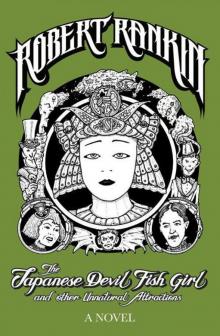 The Japanese Devil Fish Girl and Other Unnatural Attractions
The Japanese Devil Fish Girl and Other Unnatural Attractions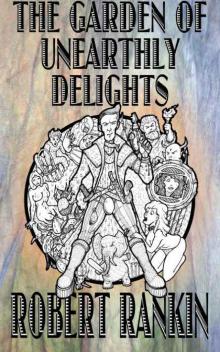 The Garden of Unearthly Delights
The Garden of Unearthly Delights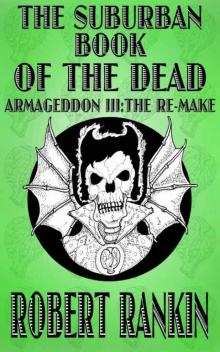 The Suburban Book of the Dead: Armageddon III: The Remake
The Suburban Book of the Dead: Armageddon III: The Remake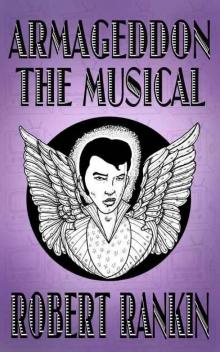 Armageddon_The Musical (Armageddon Trilogy Book 1)
Armageddon_The Musical (Armageddon Trilogy Book 1)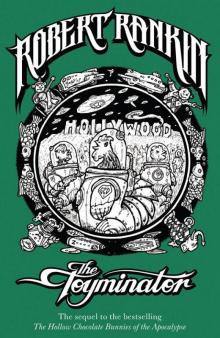 The Toyminator
The Toyminator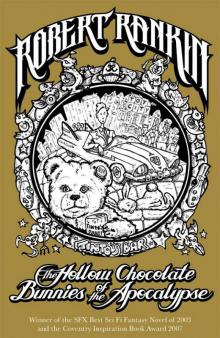 The Hollow Chocolate Bunnies of the Apocalypse
The Hollow Chocolate Bunnies of the Apocalypse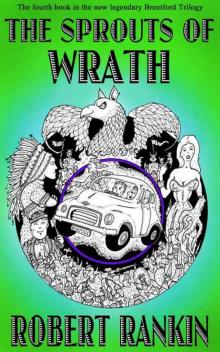 The Sprouts of Wrath
The Sprouts of Wrath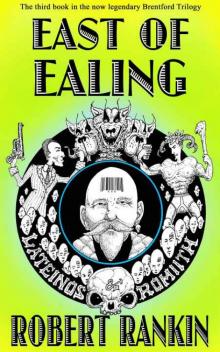 East of Ealing
East of Ealing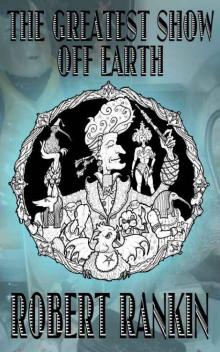 The Greatest Show Off Earth
The Greatest Show Off Earth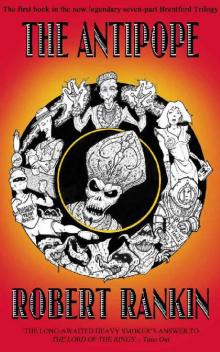 The Antipope
The Antipope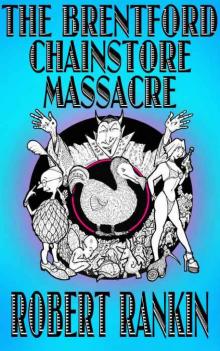 The Brentford Chainstore Massacre
The Brentford Chainstore Massacre They Came and Ate Us_The B-Movie (Armageddon Trilogy 2)
They Came and Ate Us_The B-Movie (Armageddon Trilogy 2)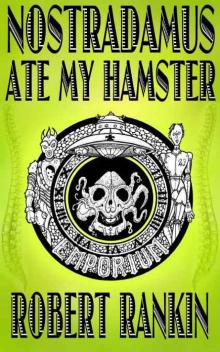 Nostradamus Ate My Hamster
Nostradamus Ate My Hamster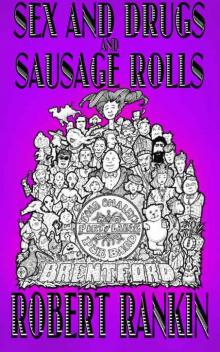 Sex and Drugs and Sausage Rolls
Sex and Drugs and Sausage Rolls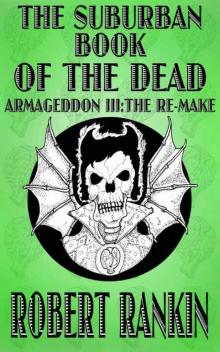 The Suburban Book of the Dead_The Remake (Armageddon Trilogy 3)
The Suburban Book of the Dead_The Remake (Armageddon Trilogy 3)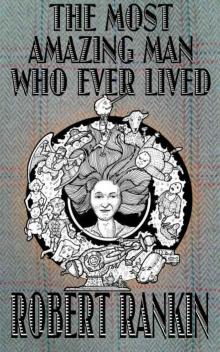 The Most Amazing Man Who Ever Lived
The Most Amazing Man Who Ever Lived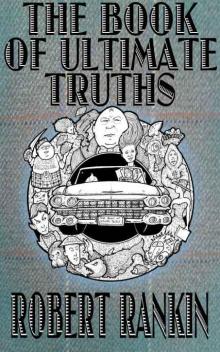 The Book of Ultimate Truths
The Book of Ultimate Truths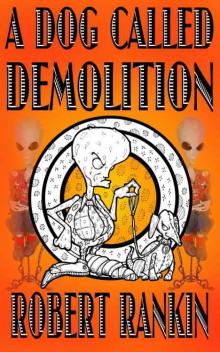 A Dog Called Demolition
A Dog Called Demolition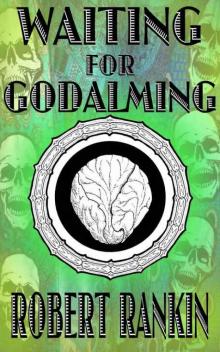 Waiting for Godalming
Waiting for Godalming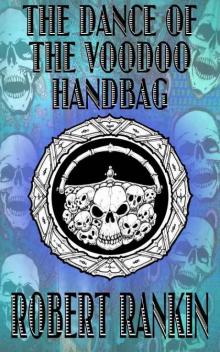 The Dance of the Voodoo Handbag
The Dance of the Voodoo Handbag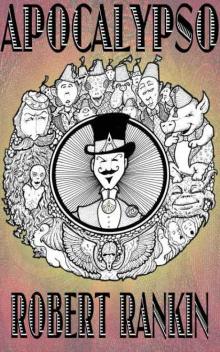 Apocalypso
Apocalypso They Came and Ate Us: Armageddon II: The B-Movie
They Came and Ate Us: Armageddon II: The B-Movie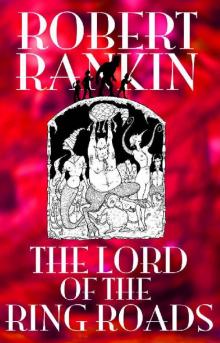 The Lord of the Ring Roads
The Lord of the Ring Roads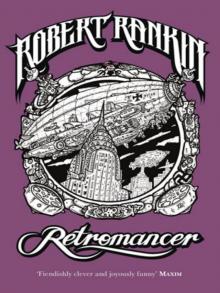 Retromancer
Retromancer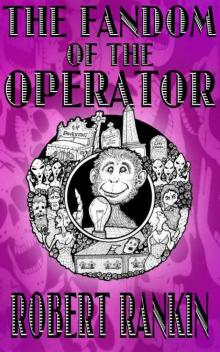 The Fandom of the Operator
The Fandom of the Operator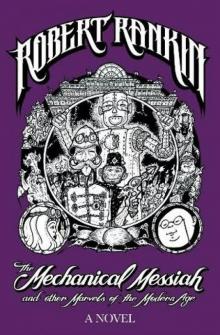 The Mechanical Messiah and Other Marvels of the Modern Age
The Mechanical Messiah and Other Marvels of the Modern Age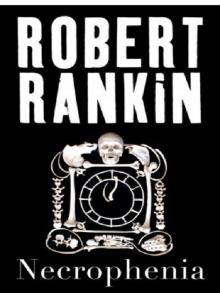 Necrophenia
Necrophenia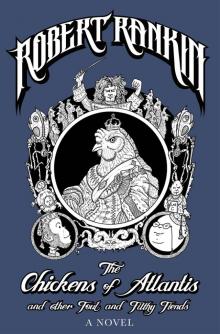 The Chickens of Atlantis and Other Foul and Filthy Fiends
The Chickens of Atlantis and Other Foul and Filthy Fiends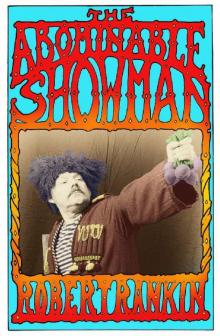 The Abominable Showman
The Abominable Showman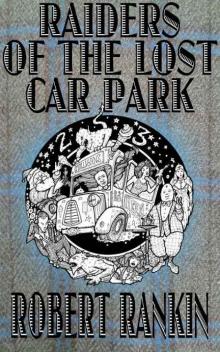 Raiders of the Lost Carpark
Raiders of the Lost Carpark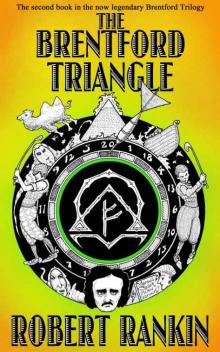 The Brentford Triangle
The Brentford Triangle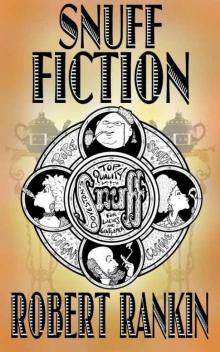 Snuff Fiction
Snuff Fiction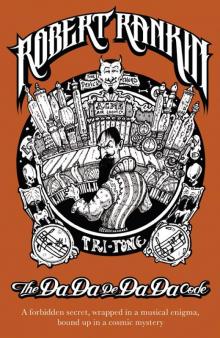 The Da-Da-De-Da-Da Code
The Da-Da-De-Da-Da Code Web Site Story
Web Site Story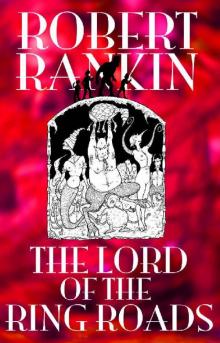 The Lord of the Ring Roads (The Final Brentford Trilogy Book 1)
The Lord of the Ring Roads (The Final Brentford Trilogy Book 1)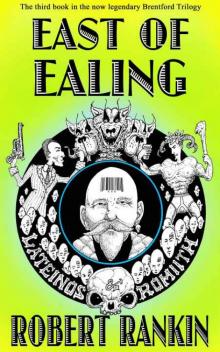 East of Ealing (The Brentford Trilogy Book 3)
East of Ealing (The Brentford Trilogy Book 3)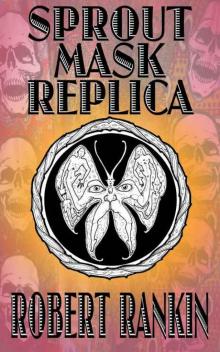 Sprout Mask Replica (Completely Barking Mad Trilogy Book 1)
Sprout Mask Replica (Completely Barking Mad Trilogy Book 1)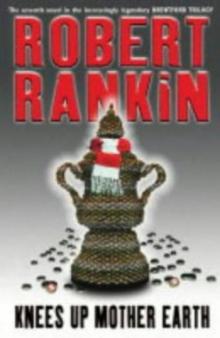 Knees Up Mother Earth bs-7
Knees Up Mother Earth bs-7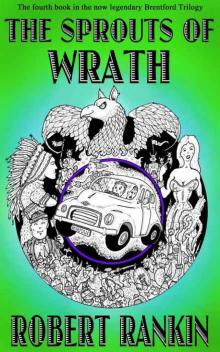 The Sprouts of Wrath (The Brentford Trilogy Book 4)
The Sprouts of Wrath (The Brentford Trilogy Book 4)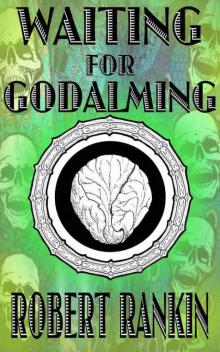 Waiting for Godalming (Completely Barking Mad Trilogy Book 3)
Waiting for Godalming (Completely Barking Mad Trilogy Book 3)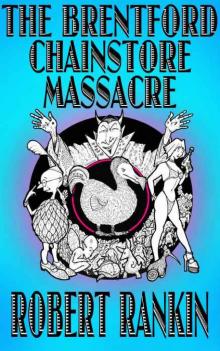 The Brentford Chainstore Massacre (The Brentford Trilogy Book 5)
The Brentford Chainstore Massacre (The Brentford Trilogy Book 5)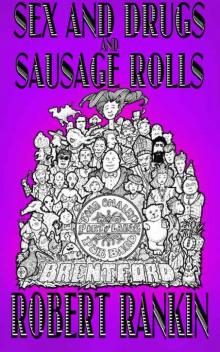 Sex and Drugs and Sausage Rolls (The Brentford Trilogy Book 6)
Sex and Drugs and Sausage Rolls (The Brentford Trilogy Book 6)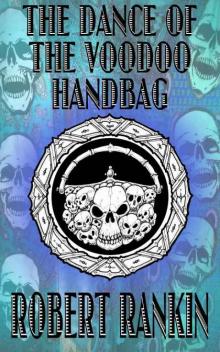 The Dance of the Voodoo Handbag (Completely Barking Mad Trilogy Book 2)
The Dance of the Voodoo Handbag (Completely Barking Mad Trilogy Book 2)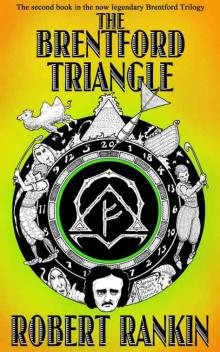 The Brentford Triangle (The Brentford Trilogy Book 2)
The Brentford Triangle (The Brentford Trilogy Book 2)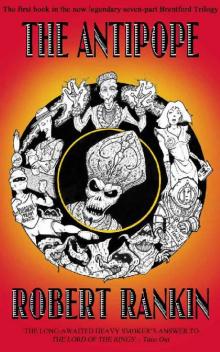 The Antipope (The Brentford Trilogy Book 1)
The Antipope (The Brentford Trilogy Book 1)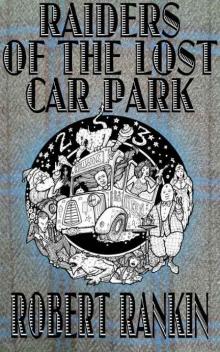 Raiders of the Lost Car Park (The Cornelius Murphy Trilogy Book 2)
Raiders of the Lost Car Park (The Cornelius Murphy Trilogy Book 2) They Came and Ate Us - Armageddon II_The B-Movie (Armageddon Trilogy Book 2)
They Came and Ate Us - Armageddon II_The B-Movie (Armageddon Trilogy Book 2)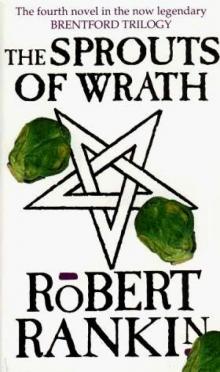 The Sprouts of Wrath bs-4
The Sprouts of Wrath bs-4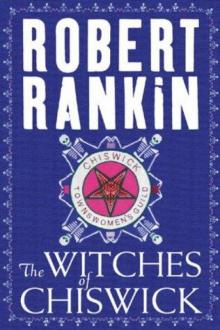 The Witches of Chiswick
The Witches of Chiswick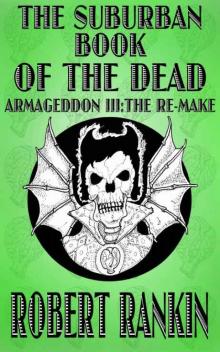 The Suburban Book of the Dead - Armageddon III: The Remake (Armageddon Trilogy 3)
The Suburban Book of the Dead - Armageddon III: The Remake (Armageddon Trilogy 3)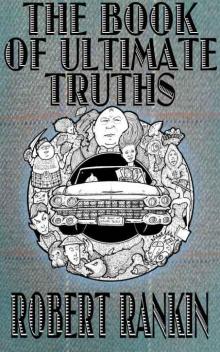 The Book of Ultimate Truths (The Cornelius Murphy Trilogy 1)
The Book of Ultimate Truths (The Cornelius Murphy Trilogy 1)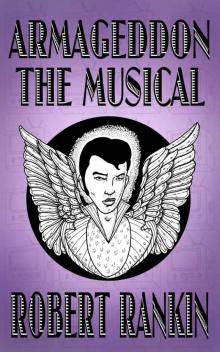 Armageddon: The Musical (Armageddon Trilogy)
Armageddon: The Musical (Armageddon Trilogy)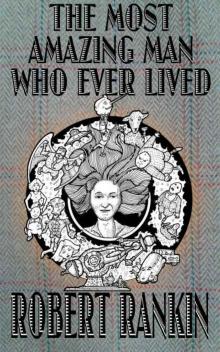 The Most Amazing Man Who Ever Lived (The Cornelius Murphy Trilogy Book 3)
The Most Amazing Man Who Ever Lived (The Cornelius Murphy Trilogy Book 3)